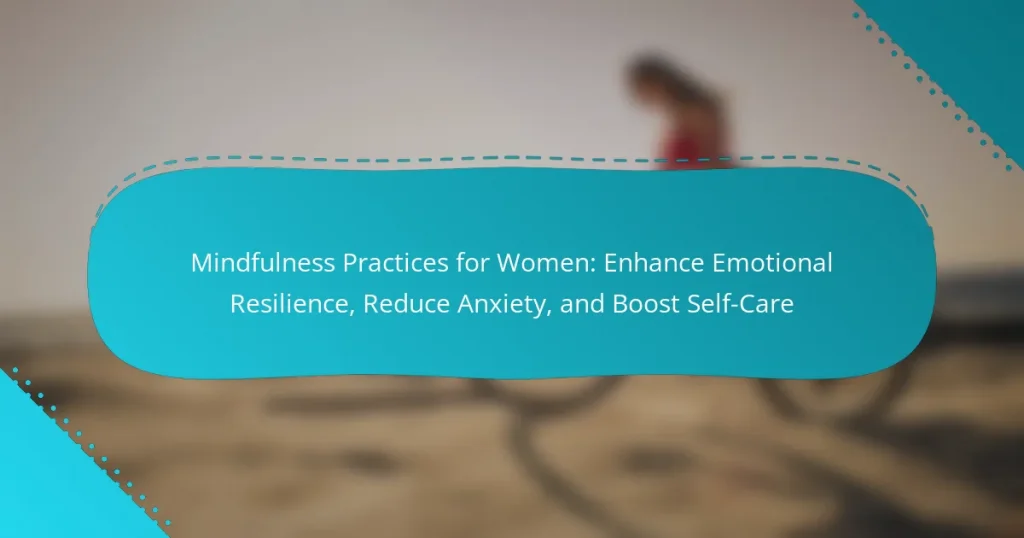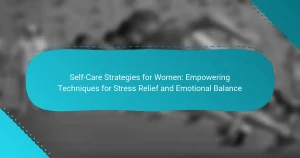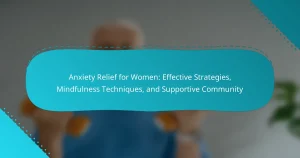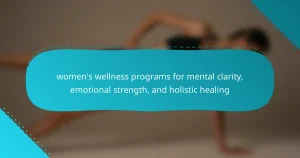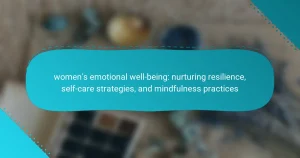Mindfulness practices for women enhance emotional resilience, reduce anxiety, and promote self-care. This article explores meditation, breathing exercises, body scans, and unique techniques like womb meditation and moon cycle rituals. Discover how integrating these methods into daily routines can foster greater self-awareness and overall well-being. Learn to avoid common pitfalls and implement expert insights for effective mindfulness.
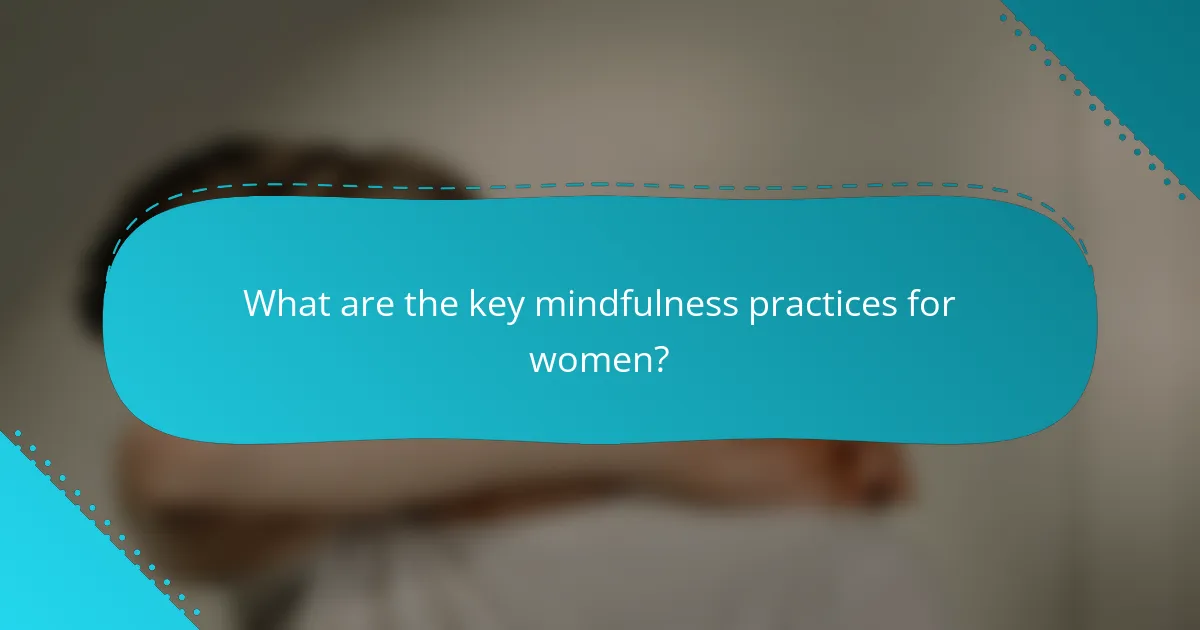
What are the key mindfulness practices for women?
Mindfulness practices for women include meditation, breathing exercises, and body scans, enhancing emotional resilience and reducing anxiety. Regular practice fosters self-care and promotes mental well-being.
1. Meditation: Daily sessions improve focus and emotional clarity.
2. Breathing exercises: Techniques like deep breathing reduce stress and promote relaxation.
3. Body scans: This practice increases body awareness, helping to release tension.
4. Journaling: Reflective writing enhances self-understanding and emotional processing.
5. Mindful walking: Engaging with the environment boosts mood and reduces anxiety.
6. Gratitude practices: Focusing on positive aspects of life fosters resilience and well-being.
How does mindfulness enhance emotional resilience?
Mindfulness enhances emotional resilience by promoting self-awareness and emotional regulation. It helps individuals recognize their thoughts and feelings without judgment, allowing for better coping strategies during stressful situations. Research indicates that regular mindfulness practice can reduce anxiety levels and improve overall emotional well-being. This practice fosters a greater sense of control over one’s emotions, leading to a more stable and resilient emotional state.
What role does mindfulness play in reducing anxiety?
Mindfulness significantly reduces anxiety by promoting present-moment awareness and emotional regulation. It enhances emotional resilience, allowing individuals to respond to stressors with greater calmness. Research indicates that regular mindfulness practice decreases anxiety symptoms, with studies showing a 30% reduction in anxiety levels among participants. Techniques like meditation and mindful breathing cultivate relaxation and focus, leading to improved self-care and mental well-being.
How can mindfulness boost self-care for women?
Mindfulness significantly enhances self-care for women by promoting emotional resilience and reducing anxiety. Engaging in mindfulness practices, such as meditation and deep breathing, helps women manage stress effectively. Studies indicate that regular mindfulness practice can lower cortisol levels, leading to improved mental health. Additionally, mindfulness fosters self-awareness, enabling women to identify and address their emotional needs. This proactive approach to self-care cultivates a positive mindset and enhances overall well-being.
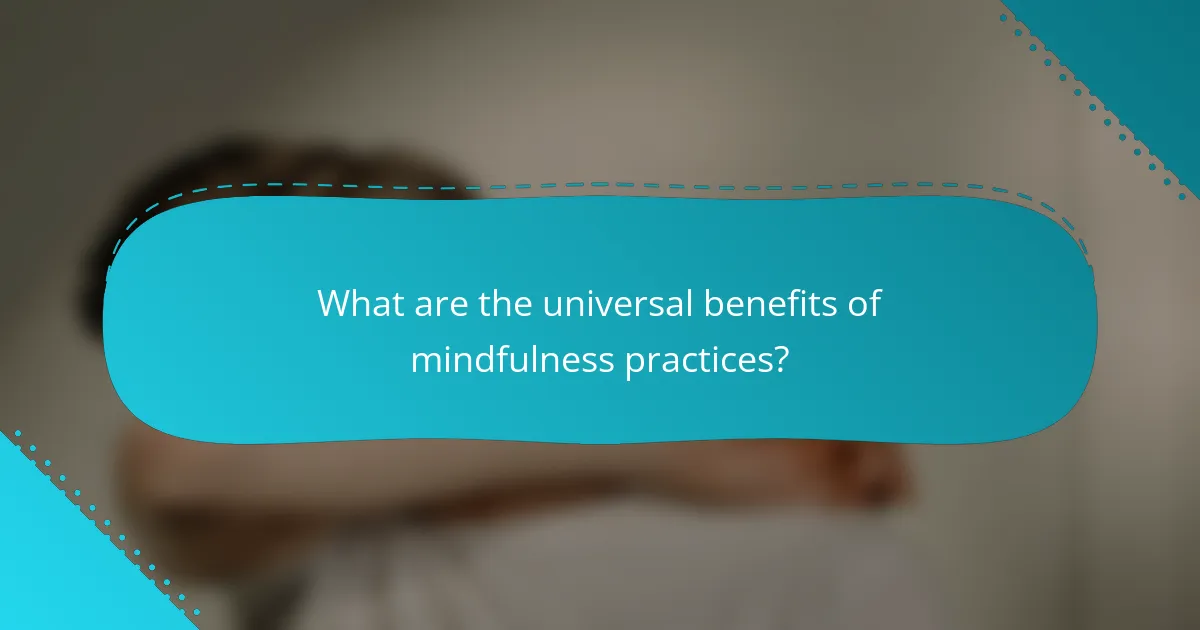
What are the universal benefits of mindfulness practices?
Mindfulness practices enhance emotional resilience, reduce anxiety, and promote self-care. These benefits stem from consistent engagement in mindfulness, which fosters a greater sense of awareness and presence. Research indicates that regular mindfulness practice can lead to a 30% reduction in anxiety levels (Keng et al., 2011). Additionally, mindfulness helps women develop emotional resilience by improving their coping strategies during stressful situations, leading to better overall mental health. Practicing mindfulness also encourages self-care by promoting a deeper connection with oneself, ultimately enhancing life satisfaction.
How does mindfulness improve mental clarity?
Mindfulness significantly enhances mental clarity by promoting focus and reducing distractions. Regular mindfulness practices, such as meditation and deep breathing, help women cultivate awareness of their thoughts and emotions. This heightened awareness leads to improved decision-making and emotional regulation. Research indicates that mindfulness can reduce anxiety levels, which further contributes to clearer thinking. By fostering emotional resilience, mindfulness enables individuals to navigate challenges with a calm and focused mindset.
What impact does mindfulness have on emotional regulation?
Mindfulness significantly enhances emotional regulation by increasing awareness and acceptance of emotions. It promotes emotional resilience, allowing individuals to respond to stressors with greater calmness. Research indicates that mindfulness practices can reduce anxiety levels and improve overall emotional well-being. Regular engagement in mindfulness techniques fosters a more balanced emotional state, leading to improved self-care and coping strategies.
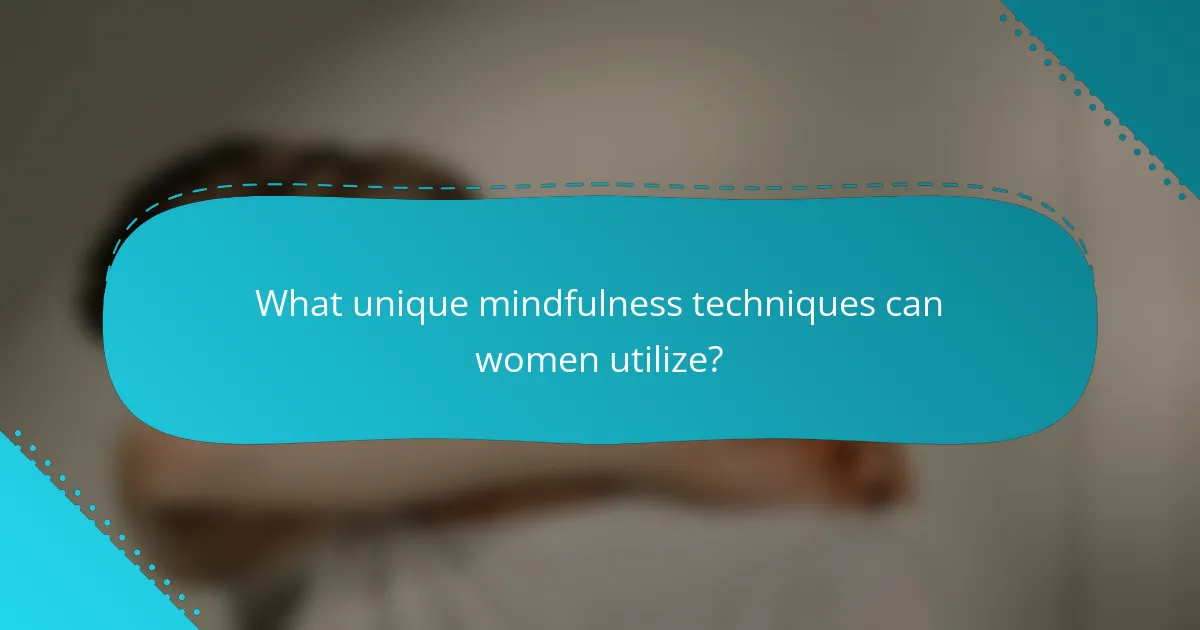
What unique mindfulness techniques can women utilize?
Women can utilize unique mindfulness techniques such as body scan meditation, mindful journaling, and nature immersion. These practices enhance emotional resilience, reduce anxiety, and promote self-care. Body scan meditation encourages awareness of physical sensations, helping to ground emotions. Mindful journaling fosters reflection and clarity, allowing women to process thoughts effectively. Nature immersion connects individuals to their environment, boosting mood and reducing stress. Each technique provides distinct benefits tailored to women’s needs, supporting overall well-being.
How can guided imagery be applied in mindfulness?
Guided imagery can enhance mindfulness by promoting relaxation and emotional awareness. This technique encourages visualization of calming scenes, which helps reduce anxiety and improve emotional resilience. Practicing guided imagery regularly can deepen self-care routines for women, fostering a greater sense of well-being.
What is the role of breathwork in mindfulness for women?
Breathwork plays a crucial role in mindfulness for women by enhancing emotional resilience and reducing anxiety. This practice fosters self-awareness and promotes relaxation, helping women manage stress more effectively. By focusing on breath, women can cultivate a deeper connection to their emotions, leading to improved mental clarity and emotional stability. Regular breathwork sessions can significantly boost self-care routines, allowing for a more balanced and mindful approach to daily challenges.
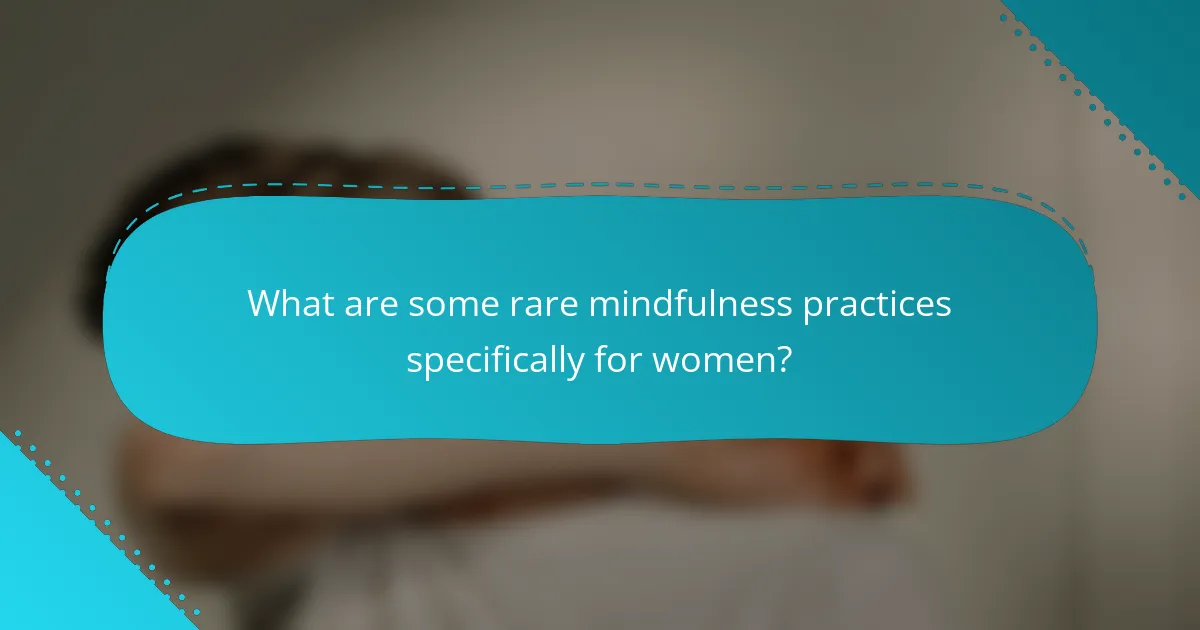
What are some rare mindfulness practices specifically for women?
Mindfulness practices for women can include rare techniques like womb meditation, which focuses on connecting with feminine energy, and moon cycle rituals that align emotional wellness with lunar phases. These practices enhance emotional resilience and self-care by fostering deeper self-awareness. Another unique approach is the use of sound baths specifically designed for women, utilizing frequencies that promote healing and relaxation. Incorporating these rare mindfulness practices can significantly reduce anxiety and improve overall well-being.
How can nature immersion enhance mindfulness experiences?
Nature immersion significantly enhances mindfulness experiences by promoting emotional resilience and reducing anxiety. Engaging with natural environments fosters a sense of calm, allowing individuals to reconnect with their thoughts and feelings. Research indicates that spending time in nature can lower cortisol levels, which are linked to stress. As a result, women practicing mindfulness in natural settings often report improved self-care and overall well-being. Additionally, unique attributes of nature, such as varied sensory stimuli, enrich mindfulness practices, making them more effective in cultivating present-moment awareness.
What is the significance of creative expression in mindfulness?
Creative expression significantly enhances mindfulness by fostering emotional awareness and reducing anxiety. Engaging in activities like painting or writing allows women to explore their feelings, promoting self-reflection. This unique attribute of creative expression serves as a powerful tool for emotional resilience, enabling deeper connections to self-care practices. Studies show that incorporating creativity into mindfulness routines can lead to improved mental health outcomes, making it a valuable practice for women seeking balance and peace.
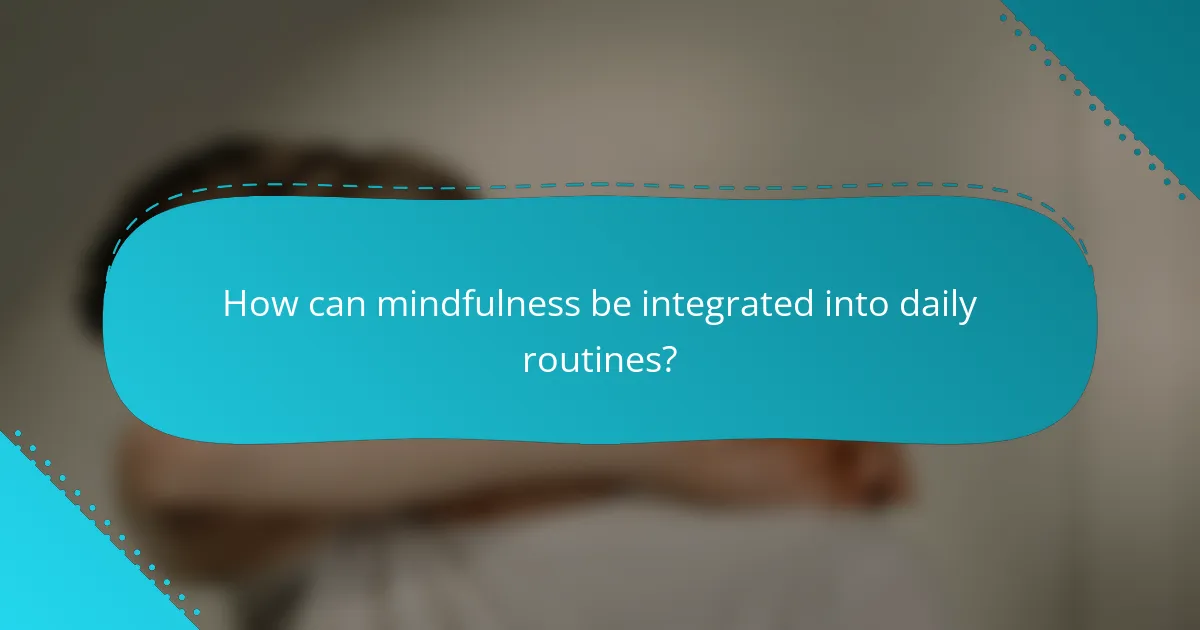
How can mindfulness be integrated into daily routines?
Integrating mindfulness into daily routines enhances emotional resilience and reduces anxiety. Start with short meditation sessions, focusing on breath awareness. Incorporate mindful eating by savoring each bite, which promotes self-care. Schedule regular breaks for mindful movement, such as yoga or stretching, to maintain mental clarity. Establish a gratitude practice by noting three positive aspects of your day, fostering a positive mindset.
What are practical steps to start a mindfulness practice?
To start a mindfulness practice, begin with daily meditation sessions lasting 5 to 10 minutes. Focus on your breath and gently redirect your thoughts when they wander. Incorporate mindfulness into daily activities, such as eating or walking, by paying full attention to the experience. Use guided mindfulness apps or resources to enhance your practice. Establish a consistent schedule to reinforce the habit. Consider journaling your experiences to track progress and insights.
How to create a mindfulness meditation space?
To create a mindfulness meditation space, select a quiet area that feels comfortable and inviting. Incorporate calming elements such as soft lighting, cushions, or a comfortable chair. Add items like plants or soothing artwork to enhance tranquility. Ensure the space is free from distractions to promote focus and relaxation.
What are the best times for mindfulness practice?
The best times for mindfulness practice include early mornings, during lunch breaks, and before bedtime. Early mornings promote a calm start to the day, while lunchtime sessions help reduce stress. Practicing before bedtime enhances relaxation and improves sleep quality.
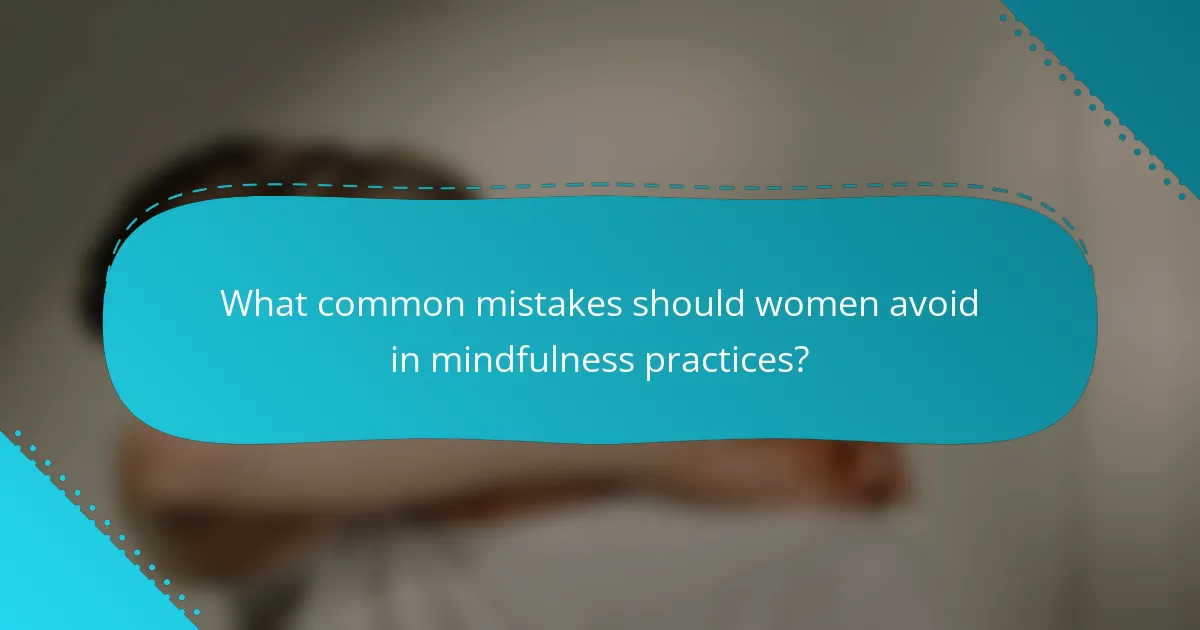
What common mistakes should women avoid in mindfulness practices?
Women should avoid common mistakes in mindfulness practices to enhance emotional resilience and reduce anxiety. Key pitfalls include multitasking during sessions, setting unrealistic expectations, neglecting consistent practice, and dismissing negative emotions. These errors can hinder the benefits of mindfulness. Prioritizing focused attention, realistic goals, regular engagement, and acceptance of all feelings leads to effective self-care.
How can unrealistic expectations hinder mindfulness benefits?
Unrealistic expectations can significantly hinder mindfulness benefits by creating pressure and disappointment. When individuals set unattainable goals, they may feel inadequate, leading to increased anxiety and reduced emotional resilience. This disconnect can prevent them from fully engaging in mindfulness practices, ultimately undermining their self-care efforts. For effective mindfulness, it is crucial to cultivate realistic, achievable expectations that foster a supportive environment for personal growth.
What are the pitfalls of inconsistent practice?
Inconsistent practice of mindfulness can hinder emotional resilience and increase anxiety. Without regular engagement, benefits diminish, leading to stress and decreased self-care. This inconsistency can create a cycle of frustration, making it difficult to develop lasting coping strategies. Establishing a consistent routine is crucial for maximizing the positive effects of mindfulness practices.
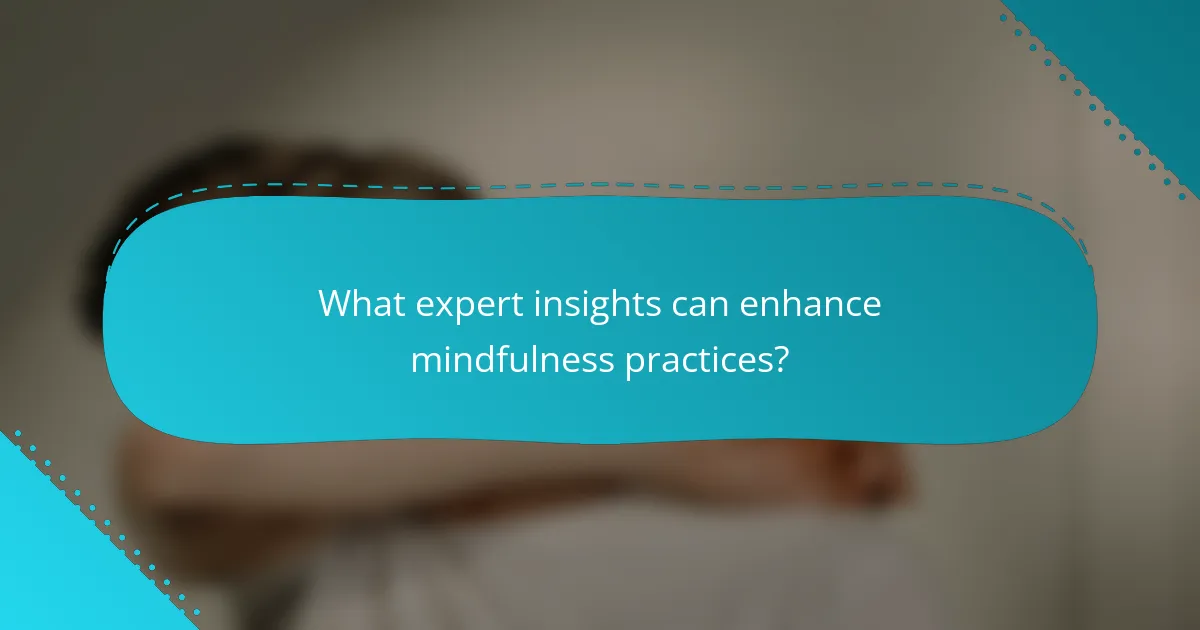
What expert insights can enhance mindfulness practices?
To enhance mindfulness practices, women can incorporate expert insights such as setting specific intentions, practicing gratitude, and utilizing breathwork techniques. These strategies foster emotional resilience, reduce anxiety, and promote self-care. Research indicates that mindfulness can lead to a 30% reduction in anxiety levels when practiced consistently. Additionally, integrating mindfulness into daily routines can improve overall well-being and mental clarity. By focusing on these actionable insights, women can deepen their mindfulness journey effectively.
What are the best practices for sustaining a mindfulness routine?
To sustain a mindfulness routine, establish consistency, set realistic goals, and create a supportive environment. Regular practice enhances emotional resilience, reduces anxiety, and boosts self-care.
Start with short daily sessions, gradually increasing duration as comfort grows. Incorporate diverse techniques like meditation, breathing exercises, and mindful walking to maintain engagement.
Track progress through journaling or apps, which can reinforce commitment and highlight improvements. Join mindfulness groups or communities to foster accountability and share experiences.
Lastly, be patient and flexible; adapt your routine to fit changing needs and circumstances for long-term success.
How can women measure their mindfulness progress?
Women can measure their mindfulness progress through self-reflection, tracking emotional responses, and assessing changes in anxiety levels. Regular journaling helps identify patterns and improvements over time. Mindfulness apps often provide metrics on meditation frequency and duration, which can also indicate progress. Additionally, participating in group discussions or workshops can enhance accountability and provide external feedback. Engaging in these practices fosters emotional resilience and self-care, essential components of mindfulness.
What resources are available for further mindfulness exploration?
Numerous resources are available for further mindfulness exploration. Books, online courses, and apps can enhance understanding and practice.
Books like “The Miracle of Mindfulness” by Thich Nhat Hanh provide foundational insights. Online platforms such as Coursera and Mindful offer structured courses tailored to different levels. Apps like Headspace and Calm facilitate daily mindfulness practices, making self-care accessible and engaging.
Additionally, local workshops and retreats provide immersive experiences, fostering community and deeper connection to mindfulness principles. Engaging with these resources can significantly enhance emotional resilience and reduce anxiety in women.
